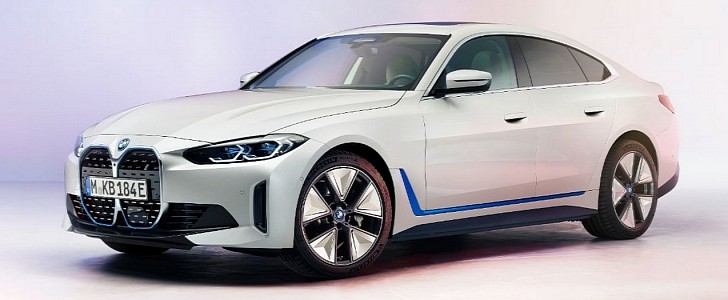A lot of people think the BMW iX is a hideous thing. The i4 is a much, much better-looking machine. According to Oliver Zipse, that does not make any difference: both of them are sold out for months, meaning that anyone willing to buy one of these electric cars will have to wait for a while.
The BMW CEO did not specify how long that would be for each vehicle in his interview with Muenchner Merkur. However, it must be quite a while. Otherwise, BMW would not be confident it would be able to hire 6,000 new people to build these EVs. That number represents a 5% increase in the number of workers BMW currently employs. Not bad…
According to Zipse, the waiting line has to do both with high demand and also with the semiconductor crisis, which restricts production volumes. Regarding the i4, the Munich factory will soon have to add an extra production shift to meet all the orders it has.
Considering that would not be possible with any component restriction, that gives us a pretty good idea of which factor plays a more significant role in this EV shortage. The BMW CEO believes the chip crisis will ease starting in the second quarter of 2022. By the end of next year, the situation should be back to normal.
The BMW i4 and the iX are the perfect evidence of how fast the electric car market is growing. Zipse told Muenchner Merkur that EV sales are increasing five times as quickly as necessary infrastructure. In the BMW CEO’s words, such an imbalance would make it an issue for governments to ban combustion-engine cars.
That would imply a retraction to automakers that these governments may not be able to afford: less money from taxes and fewer jobs would have a massive political cost. Climate change priorities would not stand against the need to pay the bills.
BMW is investing in infrastructure to avoid such a scenario, and Zipse believes BMW’s factory in Munich may be producing only electric vehicles by 2026. Curiously, this factory sits in the middle of the city, which was a problem years ago. With electric cars and modern production methods, BMW thinks that is a competitive advantage.
According to Zipse, the waiting line has to do both with high demand and also with the semiconductor crisis, which restricts production volumes. Regarding the i4, the Munich factory will soon have to add an extra production shift to meet all the orders it has.
Considering that would not be possible with any component restriction, that gives us a pretty good idea of which factor plays a more significant role in this EV shortage. The BMW CEO believes the chip crisis will ease starting in the second quarter of 2022. By the end of next year, the situation should be back to normal.
The BMW i4 and the iX are the perfect evidence of how fast the electric car market is growing. Zipse told Muenchner Merkur that EV sales are increasing five times as quickly as necessary infrastructure. In the BMW CEO’s words, such an imbalance would make it an issue for governments to ban combustion-engine cars.
That would imply a retraction to automakers that these governments may not be able to afford: less money from taxes and fewer jobs would have a massive political cost. Climate change priorities would not stand against the need to pay the bills.
BMW is investing in infrastructure to avoid such a scenario, and Zipse believes BMW’s factory in Munich may be producing only electric vehicles by 2026. Curiously, this factory sits in the middle of the city, which was a problem years ago. With electric cars and modern production methods, BMW thinks that is a competitive advantage.























